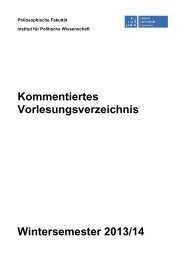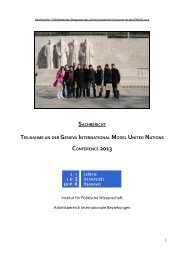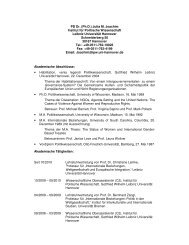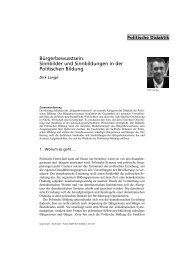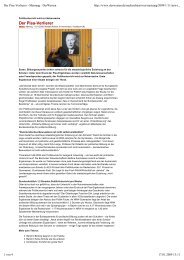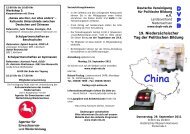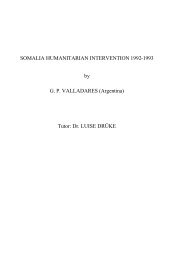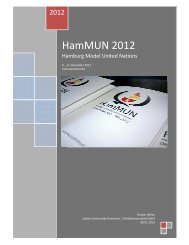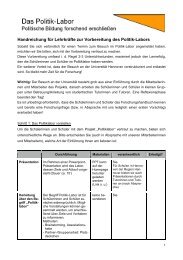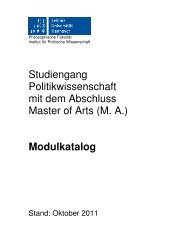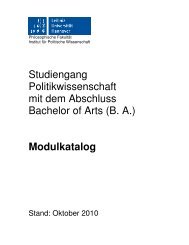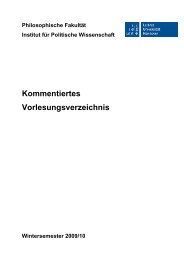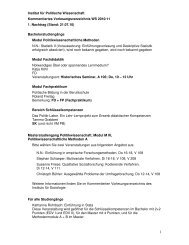Preventive Action for Refugee Producing Situations
Preventive Action for Refugee Producing Situations
Preventive Action for Refugee Producing Situations
Create successful ePaper yourself
Turn your PDF publications into a flip-book with our unique Google optimized e-Paper software.
162 Chapter 4<br />
Estimated cost <strong>for</strong> 12 months: $611 million<br />
Projected max. strength (military/police personnel): 13,870.<br />
12. UNOSOM-(Somalia).<br />
Of the above UN Peace-keeping operations, two are funded from the UN<br />
regular budget (UNTSO and UNIMOGIP), one is funded through voluntary<br />
contributions (UNFICYP) and the rest are financed from their own separate<br />
accounts on the basis of legally binding assessments on all Member States.<br />
Since the mandates of most <strong>for</strong>ces are renewed periodically starting from<br />
different dates, annual cost estimates <strong>for</strong> comparative purposes are<br />
approximate. The figures provided <strong>for</strong> operational strength, some of which<br />
include both military and police personnel, vary slightly from month to month<br />
due to rotation. 371<br />
ii) What kind of <strong>for</strong>ces could be made available?<br />
Four of the above mentioned operations have also civilian police personnel.<br />
For 13 operations established between 1956 and 1985, the major troop<br />
contributors have been the Nordic countries (except Iceland), Austria,<br />
Canada, and Ireland. Some of them were Non-Aligned. All of them<br />
maintained a neutral view of the conflicts making them acceptable to the<br />
parties concerned. They made available personnel, equipment and training,<br />
with which they had contributed, as of 1987, out of approximately 450,000<br />
men and women in UN peace-keeping operations. 372<br />
These countries gained considerable experience during the early years,<br />
especially from the Congo, Gaza, and Cyprus. 373 Despite the experience<br />
gained, there is a clear need <strong>for</strong> strengthening the UN ef<strong>for</strong>ts in training and<br />
education - along the same lines as UNHCR, UNICEF and other UN organs<br />
dealing wiÄ emergency management <strong>for</strong> higher efficiency in cost and<br />
benefits. In the face of dramatic changes worldwide, the UN will need to<br />
expand its role in planning,<br />
371 Background Note, United Nations Peace-keeping Operations, Fact-sheet,<br />
Prepared by the Communications and Project Management Division,<br />
Department of Public In<strong>for</strong>mation, United Nations PS/DPI/15 - March 1992.<br />
372 Lt. Cor. Christian Harleman, Peacekeepers <strong>for</strong> a Changing World. Presentation<br />
given to the Special Committee on Peacekeeping Operations, 14 May 1991, pp.<br />
1,2.<br />
373 The Blue Helmets. A Review of United Nations Peace-keeping. Second Edition.<br />
1990, United Nations, New York.<br />
New Approaches and Policies 163<br />
implementing, conducting and controlling complex UN field operations.<br />
These will increasingly be composed of civilian personnel. There are<br />
suggestions to establish regional training centers.<br />
The New York Training Seminar on Peace-keeping, which took place<br />
on 23 - 27 March 1992 had the purpose to develop a working understanding<br />
and knowledge of peace-keeping operations as a major instrument of the<br />
United Nations <strong>for</strong> the maintenance of international peace and security.<br />
Distinguished speakers, experts in the field presented and discussed a<br />
number of issues related to the subject with the participants mainly from<br />
Permanent Missions to the UN and UN Headquarters officials. The Director<br />
of the Training Programmes <strong>for</strong> Peace-keeping and Peace-making of the<br />
UNITAR Office provided a comprehensive handfile <strong>for</strong> this Seminar that<br />
contains a rich source of documents and most recent research results. 374<br />
As Sweden has made an outstanding contribution to peace-keeping in<br />
terms of training and equipment, it is discussed here in more detail as an<br />
example. After some discussion, the Parliaments of Sweden, Denmark and<br />
Norway decided in 1964 to organize Stand-By Forces, and Finland<br />
simultaneously decided to do the same. Thereafter, Sweden gradually<br />
developed a system <strong>for</strong> recruiting, organizing, training and serving abroad.<br />
Ten years later in 1974, the Swedish Parliament adopted a bill which<br />
provided the constitutional framework <strong>for</strong> the Swedish-Stand-By Forces,<br />
which stipulates the following:<br />
- within the Defense Forces there shall be a military <strong>for</strong>ce voluntarily organized<br />
as a Stand-By Force,<br />
- the Government is authorized to put this <strong>for</strong>ce at the disposal of the United<br />
Nations,<br />
- the Force consists of a maximum of two battalions and a special unit of a size<br />
not exceeding a third battalion (mil. observers, disaster relief units, etc.),<br />
- the personnel of the Stand-By Forces is employed <strong>for</strong> this purpose.<br />
Implementing this bill, the Government had instructed the Supreme Commander of the<br />
_____________________________<br />
374 Lt. Cor. Christian Harleman. "Handfile <strong>for</strong> New York Training Seminar on Peacekeeping",<br />
23 - 27 March 1992 contains sections on Introduction/Background,<br />
Establishment Operation, Management Structure, Developments, En<strong>for</strong>cement and<br />
Conclusions. UNITAR, 801 United Nations Plaza, New York, NY 10017. Papers<br />
contained include "Negotiation to Establish a Peace-keeping Operation" By C.<br />
Harleman; "Operational Effectiveness of a Peace-keeping Operation" by Col. H.<br />
Purola, Deputy Military Advisor to the Secretary-General; "United Nations Peecekeeping<br />
Operations: Some Swedish Views and Experiences" by Lars-Goran<br />
Engfeldt, Deputy Permanent Representative of Sweden to the UN in New York.



